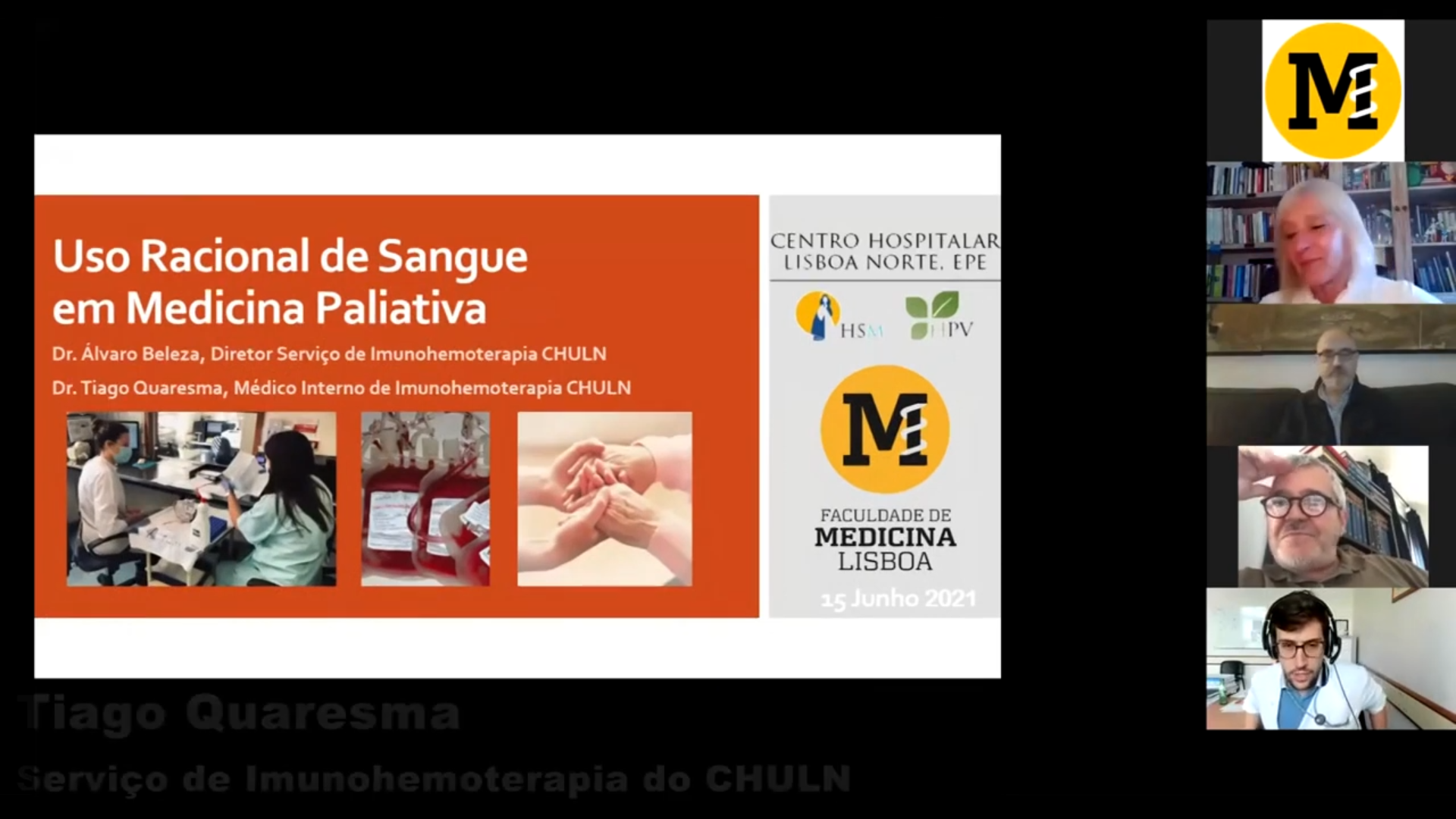
On 15 June, the well-known “Talking with…” sessions returned. This time, the topic was about the “Uso Racional do Sangue na Medicina Paliativa” (Rational Use of Blood in Palliative Medicine)”, an initiative of the Palliative Medicine Centre.
This session, moderated by Marina Caldas, Director of FDC Consulting and journalist, was attended by Paulo Reis Pina, FMUL Professor and specialist in Internal Medicine and holder of a postgraduate degree in Pain Medicine and Geriatrics, Rui Tato Marinho, FMUL Professor and Director of the Gastroenterology and Hepatology Service at the Northern Lisbon University Hospital Centre (CHULN) and Álvaro Beleza, Director of the ImmunoHemotherapy Service at CHULN.
The session began with an introduction to the topic by moderator Marina Caldas, referring that blood is a rare and scarce resource and that patients followed in palliative care complain of tiredness and shortness of breath due to anaemia. She left in the air the questions about what can be done, alternatives, and the future.
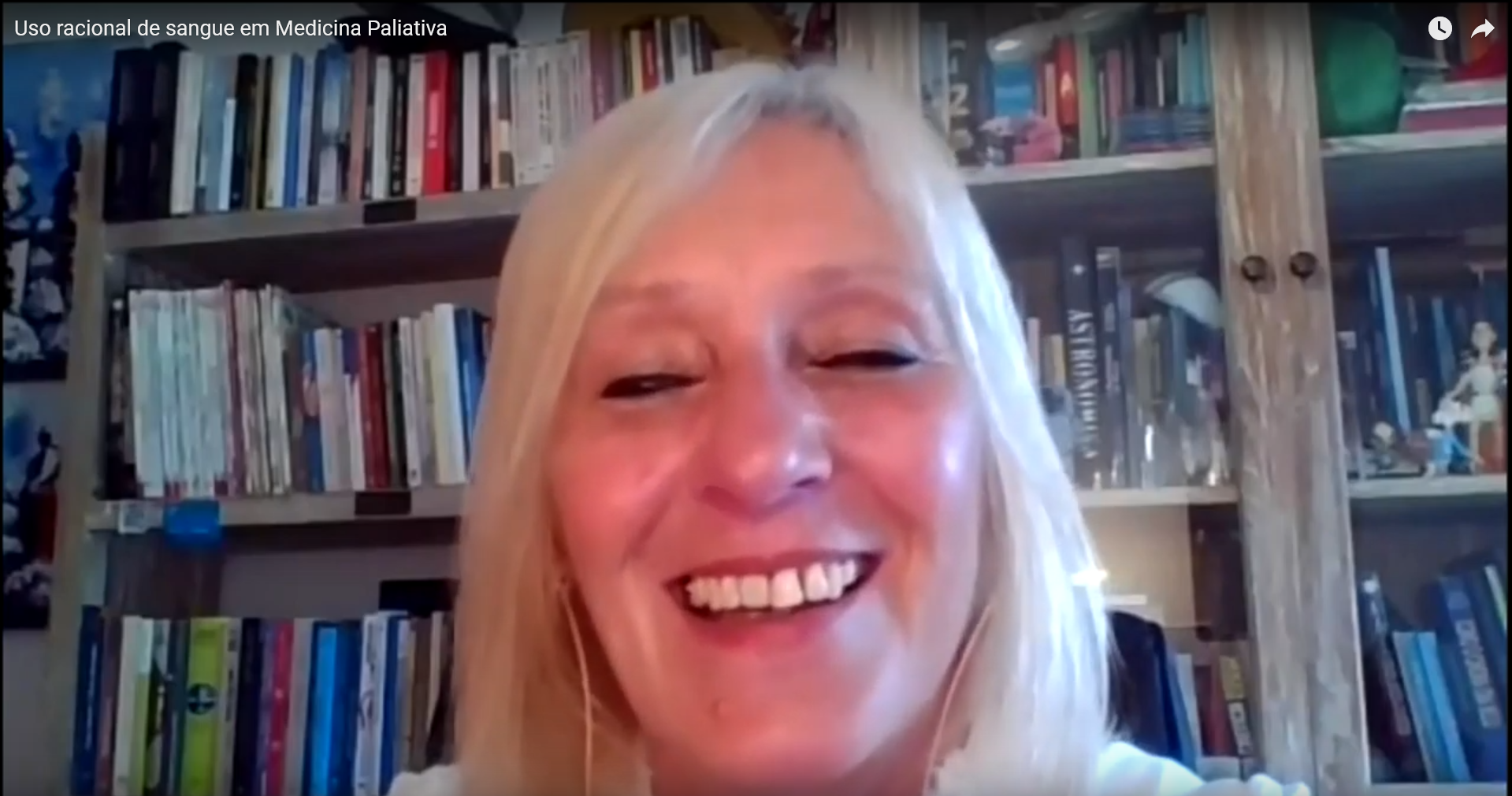
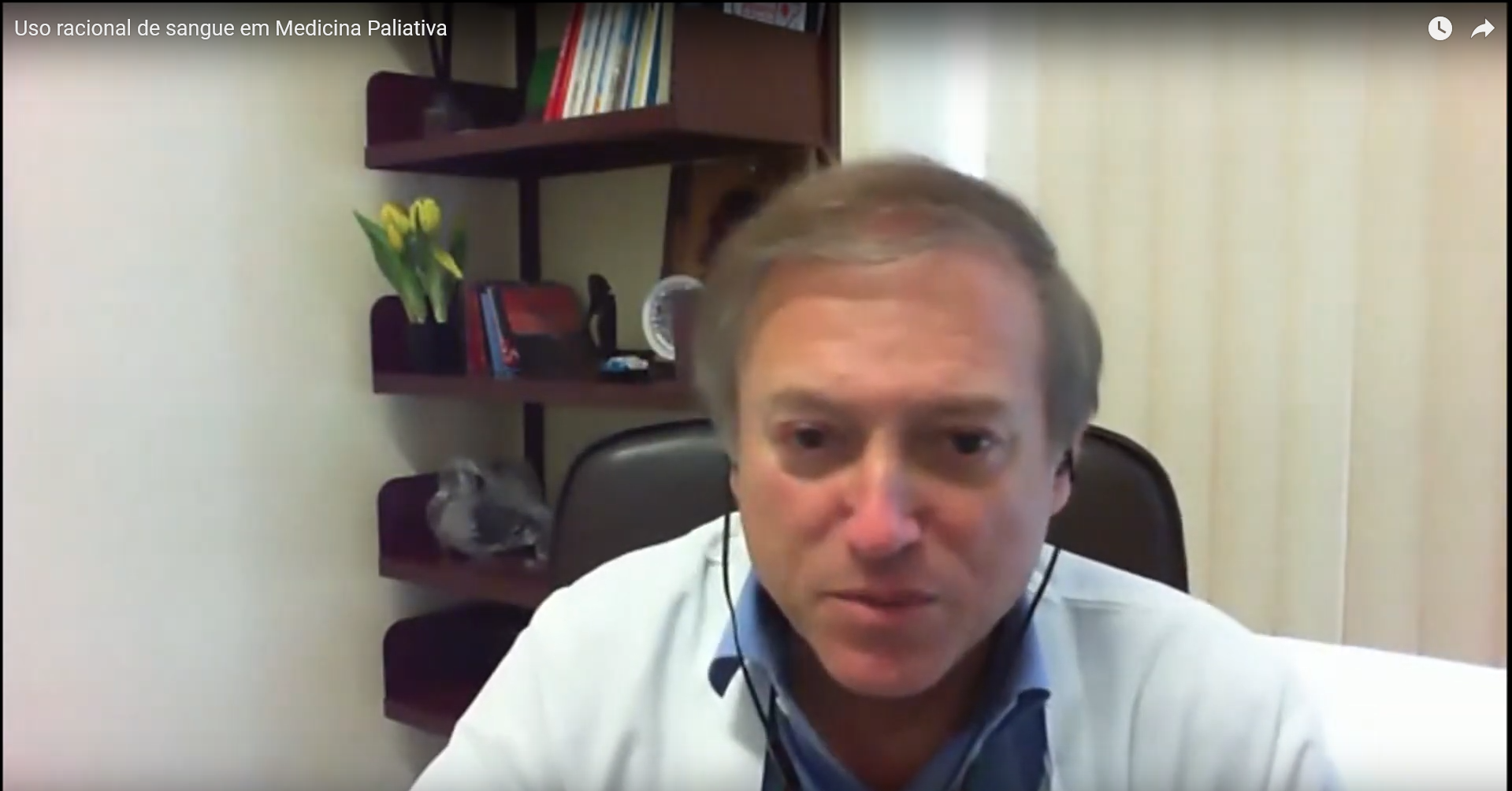
She then gave the floor to Professor Tato Marinho, who highlighted the importance of blood, referring to it as “red gold” and a precious asset. He mentioned his excellent team, especially regarding their ability to control bleeding.
Equating blood to a medicine, he said it is the 4th most used in Portugal. He emphasized that there is no genetic engineering that produces blood and that its use must be balanced. Patients die less with less blood than with excess of it. He stressed that it is not easy to get access to blood, as it depends on healthy people donating it. He said there are risks, however small (fever, communicable diseases, unexpected reactions), that it is expensive. There are fewer donors and he also talked about reducing use and its alternatives.
Professor Paulo Reis Pina began his presentation reflecting on the title of this session, saying that transfusions must be well-thought-out. In cases of chronic anaemia, for example, alternatives can be considered. It is necessary to understand what is intended with the transfusion. A healthy system has the ability to return to the norm. Based on general systems theory, if a patient does not return to the norm, it is because homeostasis is lacking. Faced with such a system, with increasing entropy, without the capacity to go back, one cannot be stubbornly giving platelets or other products. Blood transfusion can be bad clinical practice. He emphasized the importance of focusing on patients, which is the standard behaviour in palliative medicine. There are blood substitutes, oral or injectable, that can be part of the decision, but for a patient who is tired, short of breath, or dependent on goals that he still has, a transfusion is pondered, and the attitude depends on the values of the patient and scientific evidence. He said that palliative medicine could be called support medicine, but unfortunately patients often arrive too late and transfusions in general terms are no longer appropriate, taking into account specific protocols.
The moderator posed a pertinent question, on how to get this message across to the public without getting the wrong idea of “patient selection”. Professor Paulo Pina stressed that medicine has to be reinforced by scientific evidence, and that the therapeutic decision has to take into account the disease and the indication for the therapeutic process. First the scientific evidence, then the patient's values taking into account his will, but the patient does not choose therapies. These are not easy processes, but they have to be done according to good clinical practice.

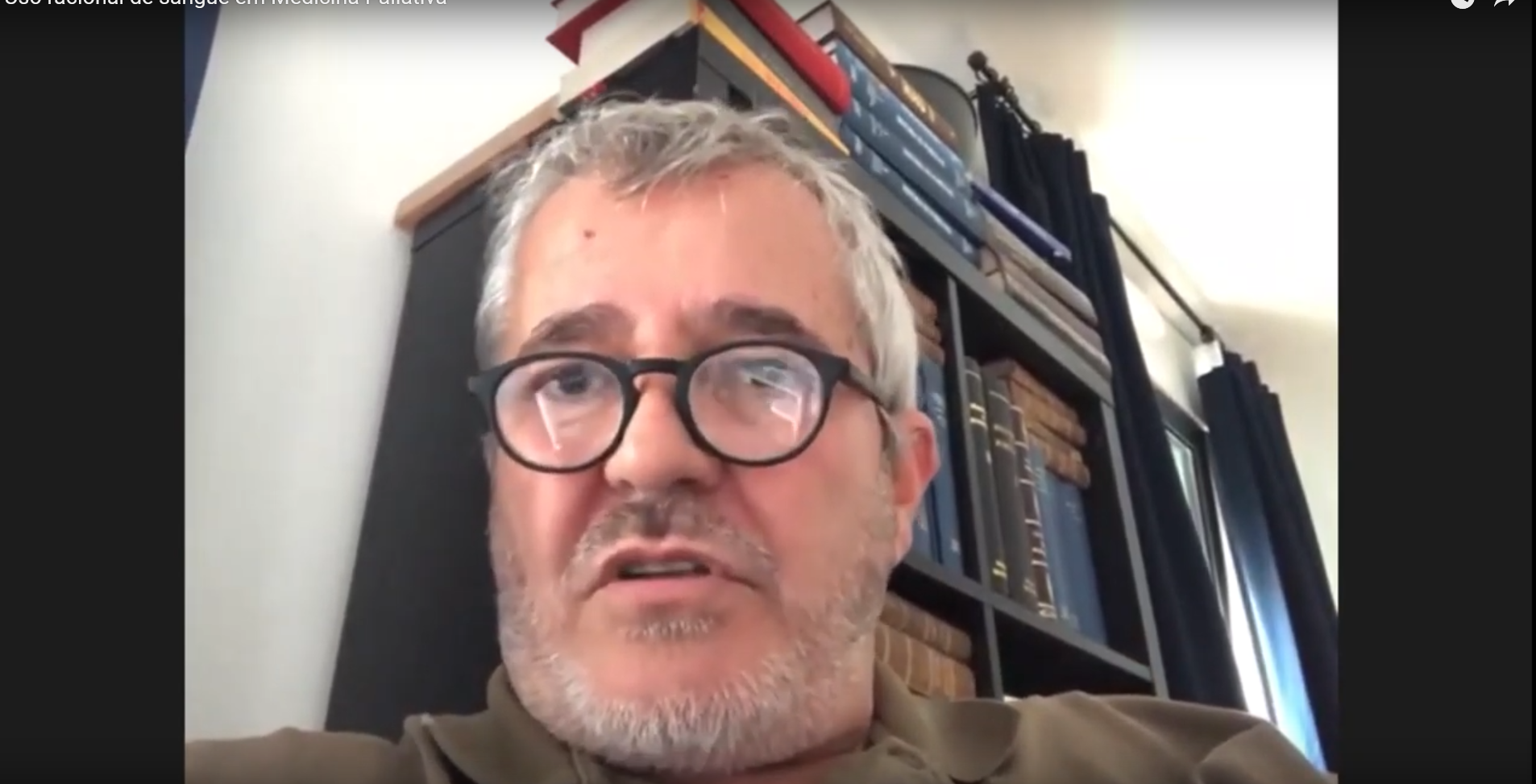
Dr Álvaro Beleza agreed and gave an idea of what is done at Santa Maria Hospital: 12,000 sessions a year in day hospitals, 6,000 consultations a year, and palliative care patients undergoing transfusion therapy. This therapy consists of a transplant, with transfusion only if necessary, but this does not depend on age, only on need. The criteria are clinical.
Physician Tiago Quaresma, an intern at the ImmunoHemotherapy service, gave a presentation on the activity of this service. He identified the symptoms that are treated in this department, such as anaemia and thrombocytopenia. The vast majority of patients in need of palliative care have metastatic solid tumours (82%), haematology disease (15%) or other cases (2%). He also mentioned the therapies performed: 63% of patients receive iron, and darbepoetin is administered to 48% of patients. Replacement therapies are often possible. Only a third of patients undergo a complete transfusion. He also mentioned the importance of empathy in dealing with patients and how this is essential in their evolutionary process.
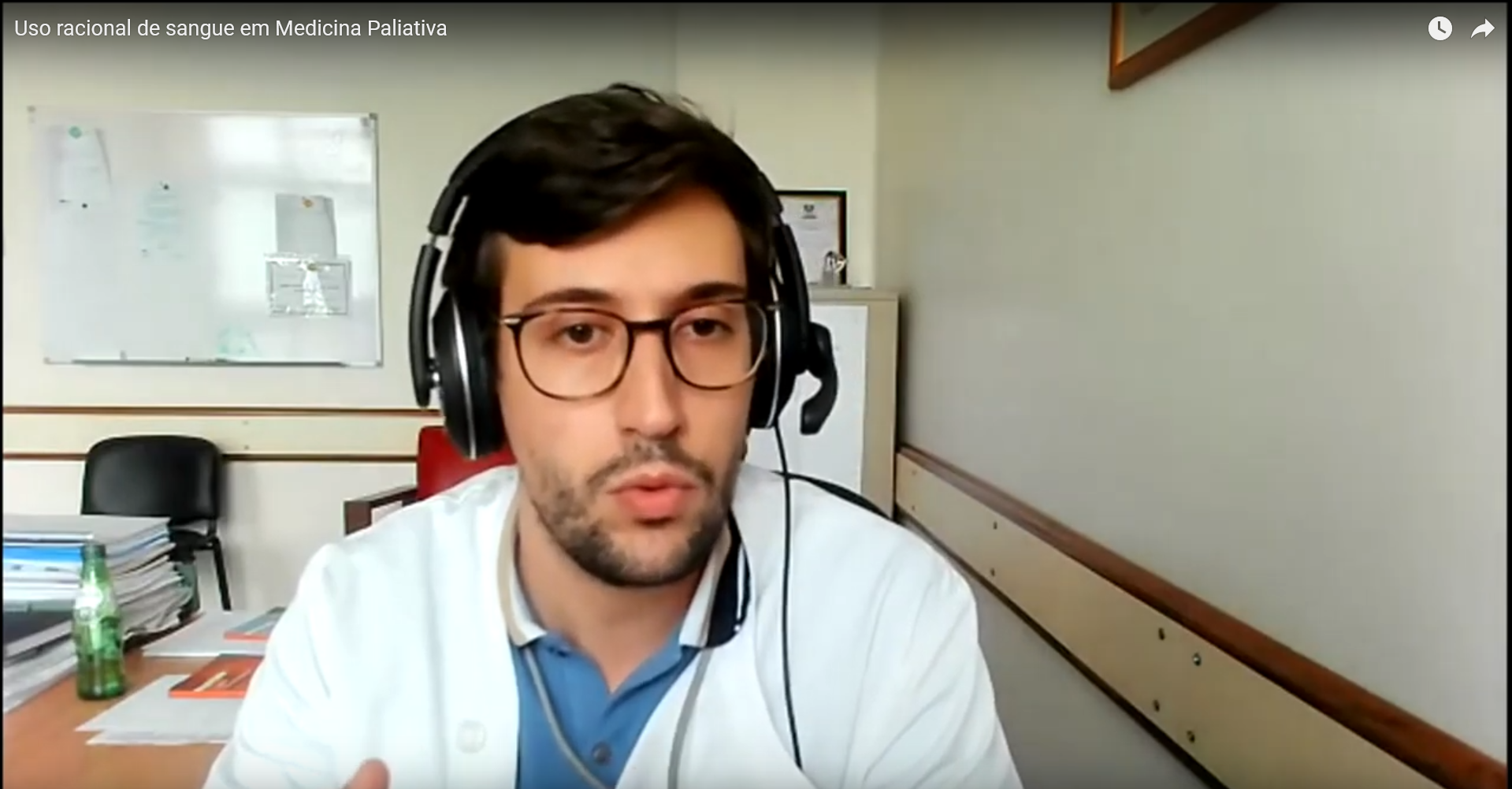
Regarding empathy, Professor Tato Marinho left a very clear message that he learned from palliative medicine. It is not the time allocated to each patient that matters, compassion does matter, a smile, a look, a brief conversation.
The moderator then asked how to look to the future, what alternatives are there? Professor Paulo Pina clarified, “it is necessary to understand until when transfusions are made, that is, to understand what the patient's performance is before the transfusion and for how long the patient will improve”. One has to understand how the patient is dealing with his situation, if he understands the risks of transfusion. This needs to be communicated to the patient. In advanced stages the risks are actually greater. It is important to investigate retrospectively to understand the benefits of transfusions, at which stage of the disease they are, among other things.
Álvaro Dias added that Portugal has reduced the number of transfusions, 10% in recent years. In Santa Maria, they were reduced by 30%, which is considered great rationalization of blood. One always has to think about the risks and the advantages.
Marina Caldas said that it is very difficult to pass this message on to patients and their families and asked those present if they care about it. Álvaro Dias stressed that a doctor, above all, has to be human, empathetic, listen and look at the patient. Doctors have to be great communicators. A trusting relationship with the patient has to be established. Dr Tiago Quaresma added that it is important to know what the patient's life is like, it is important to understand the risk. For example, regarding the time it takes to get to the hospital in cases of perforated veins, it is important to manage the transfusion time with the family, which should happen when there is greater benefit and need.
As a last message, Professor Paulo Pina mentioned the need for attention and care for others, and for attention in managing the disease and the patients. It is necessary to have a bigger plan for the patient, whose value is incalculable. We have to manage vulnerable people and show them that transfusion does not prolong their lives. More studies are needed to realize the benefits, in whom and how. The important thing is to demonstrate that the patient is not going to be abandoned.
Álvaro Beleza ended this session by mentioning that it is important to become serious in dealing with death and with this culture through fear. Communication has to be taken care of. Doctors have an important role when speaking to the public, they have to pay attention to the interlocutors. The importance of the physician today is much greater than in the past, as they replaced several institutions and there is great trust in doctors.
Sónia Teixeira
Editorial Team

